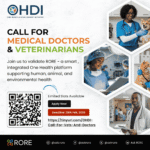The Animal Production and Health Division (NSA) promotes and facilitates the sustainable development of the livestock sector, optimizing its contribution to nutrition, food security and rural poverty reduction. NSA integrates scientific, technical expertise and policy advice, it facilitates policy dialogue (including through intergovernmental bodies), encourages good governance, manages knowledge and provides information, analysis and technical assistance for the development and implementation of innovative solutions to produce safe animal products more efficiently, more responsibly and in a more integrated manner. The post is located in the Animal Production and Genetics Unit (NSAG). The activities of the Unit cover all production systems, from pastoralism to intensive systems, including crop-livestock integrated systems, and aims to enhance their sustainability in its three pillars: environmental, economic and social. NSAG has developed a program of work of technical assistance to countries and International Funding Institutions on livestock solutions for climate change. This includes capacity development on assessing climate co-benefits of livestock projects and investments, including with the FAO tool GLEAM-i, an on-line GHG emission calculator specific to livestock.
Technical Focus
Estimations of GHG emissions from livestock production systems in support to NSAG’s work on technical assistance and capacity development on livestock solutions for climate change.
Tasks and responsibilities
Under the direct supervision of the Livestock Development Officer (NSAG) and in collaboration with the World Bank, IFAD, IFC as well as other staff and consultants in the unit and in FAO, the consultant will contribute to NSAG’s programme of work on Low carbon and resilient livestock investments and projects. In particular, the consultant will:
– Contribute to the technical assistance (TA) provided by FAO to International Funding Institutions (IFIs) such as World Bank, IFAD and IFC in various countries. This includes:
- Support the development and delivery of trainings on climate smart livestock, at national and sub-national level;
- Contribute to the assessment of the impact of investments and projects on CSA pillars with the FAO GLEAM-i tool, including through improvements in herd, feed and manure management;
- Contribute to providing guidance for better inclusion of CSA in investments and projects.
- Contribute to writing reports, policy briefs and publications on the role of livestock in CSA, GHG emissions assessments in low and middle income countries;
- Contribute to mobilise governments and partners such as IFIs, research institutions and NGOs;
- Any other duty as agreed with the Livestock Development Officer.
Minimum Requirements
- University degree in agricultural, animal or environmental sciences.
- At least 1 years of professional experience in the field of livestock development, climate change adaptation and mitigation, modelling of agricultural systems or sustainable management of natural resources.
- Working knowledge of English and limited knowledge of French, Spanish, Arabic, Chinese or Russian for Consultants. Working knowledge of English will be sufficient in the case of PSAs.
FAO Core Competencies
- Results Focus
- Teamwork
- Communication
- Building Effective Relationships
- Knowledge Sharing and Continuous Improvement
Technical/Functional Skills
- Work experience in more than one country or area of work
- Extent and relevance of experience in modelling livestock production systems
- Extent and relevance of experience in climate change mitigation and adaptation
- Familiarity with GHG emissions calculators
HOW TO APPLY
- To apply, visit the recruitment website at Jobs at FAO and complete your online profile. We strongly recommend that your profile is accurate, complete and includes your employment records, academic qualifications, and language skills
- Candidates are requested to attach a letter of motivation to the online profile
- Once your profile is completed, please apply, and submit your application.
Application deadline is April 15, 2022.





